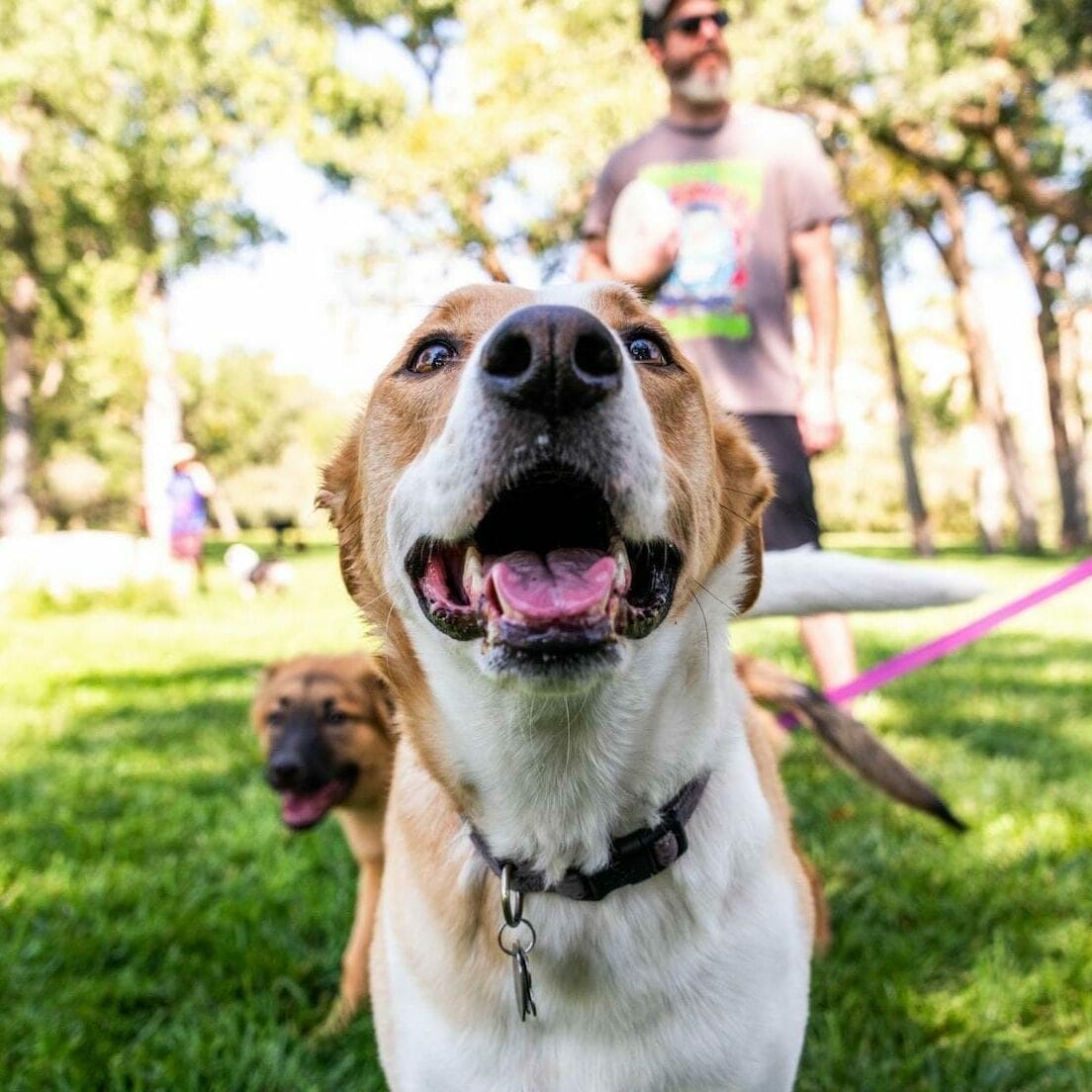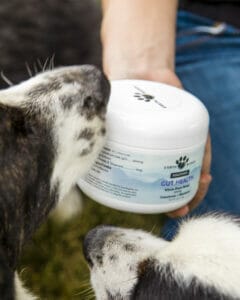As a dog owner, you may have often found yourself perplexed, watching your canine companion munch away at the lawn as if it were a delicacy. Why do dogs eat grass? While chewing grass may be puzzling, it’s not uncommon. Dogs eating grass is a behavior seen in many canines, leading us to ask questions about why it’s happening and what can be done to promote digestion in your dog.
Why Do Dogs Eat Grass: Ancestral Eating Habits
The consumption of grass by domestic dogs is a behavior that has intrigued researchers and pet owners. One hypothesis states that this behavior can be traced back to their ancestral eating habits. Wild canids, including the wolves from which domestic dogs are descended, are known to have a diet that encompasses more than just animal flesh. In the wild, wolves are opportunistic feeders that consume a variety of plant material, including fruits and vegetation, to fulfill specific nutritional needs.
It is thought that the domestic dog’s desire to consume grass could be a surviving trait, a lingering instinct from their ancestors. This behavior may have evolved to help them scavenge and derive essential nutrients or fiber that may not be present in a meat-centric diet. Plant matter could promote intestinal well-being, promote the body’s innate resistance to pathogens, or provide essential nutrients that are otherwise lacking in their diet.
While the ancestral eating habits theory does not account for all instances of a domestic dog’s grass eating, it offers an evolutionary perspective that could partially explain this behavior.
Dog Eating Grass For Occasional Gastric Distress
Another prevailing theory suggests that dogs may eat grass during times of occasional discomfort. While there is still a need for more rigorous scientific evidence to fully substantiate this claim, anecdotal observations and some preliminary studies hint at this possible explanation.
Eating grass could potentially promote your dog’s stomach health by:
- Supporting normal GI health and function
- Working as a digestive aid
- Helping maintain a healthy intestinal tract
You should also ask your vet to check for any underlying health issues, especially if your dog is experiencing occasional discomfort. Ask your vet if everything checks out with your dog’s digestive system.
Filling in the Gaps: Nutritional Deficiency
This behavior may also occur when a dog is nutritionally deficient. While domestic dogs are primarily carnivorous, they are also facultative omnivores capable of consuming a range of foods. That’s why you see many canine nutritionists recommending diets containing the entire animal. This is referred to as prey model raw.
Grass is a source of certain nutrients, like plant fiber, and may contain trace amounts of minerals or phytonutrients that can contribute to a dog’s overall nutrient intake. Dietary fiber, for instance, can support normal bowel function and a healthy gut.
In the wild, the diet of ancestral canines would have been more varied, incorporating plant matter either through direct consumption or indirectly through the stomach contents of prey animals. Grass-eating may be seen as an evolutionary leftover, a means by which dogs attempt to balance their nutritional needs, with the entire animal provided as a food source.
Lack of Fiber and A Dog’s Grass Eating Habit
Lack of fiber could be another one of the reasons dogs eat grass. Perhaps there isn’t enough fiber in your dog’s diet. Fiber plays a crucial role in canine digestion, helping to support proper digestion and bowel health. Fiber also:
- Supports proper balance of normal intestinal flora
- Support the growth of beneficial bacteria in the intestines
If you believe your dog could use some extra fiber, consult your veterinarian about how to develop a properly balanced diet for your pup. A canine nutritionist may also be able to help if your dog is eating too much grass.
Dog Eating Grass Due to Behavioral Response
The act of grass-eating in dogs may not always have to do with their diet. It could also be a behavioral response in many dogs. While it may not make complete sense to us, when dogs are bored, dogs may eat grass to:
- Help reduce hyperactivity and promote relaxation
- Support balanced behavior
- Helps work as a coping mechanism with external stresses
Dog Eats Grass Excessively
Pica is a behavioral condition that causes the consumption of non-food items. In dogs, pica may manifest through the ingestion of a variety of objects such as rocks, plastic, fabric, or even feces.
While some level of oral fixation and exploration is considered normal canine behavior, especially in young dogs, if your dog is eating grass excessively, that could indicate this type of problem. If your dog eats grass excessively, or any other item, it’s time to talk to your veterinarian before it affects bodily functions.
Younger Dogs Are More Prone To Eating Grass
Puppies may be more prone to consuming grass than adult dogs. If you’ve ever had puppies, you know they’re extremely curious, more so than other dogs older than them. This exploratory behavior often involves using their mouths to interact with various objects, including vegetation like grass.
Another angle to consider is that puppies, being in the developmental stage, may be more likely to experiment with different textures and flavors as they mature and refine their dietary preferences. This might make them more inclined to try eating grass, even if they later grow out of the habit.
Be Careful With Herbicides If Your Dog Eats Grass
If your dog is eating grass, a notable concern is the potential ingestion of herbicides, pesticides, and harmful bacteria that may be present on the grass. Lawns, especially those in public parks, are often treated with chemical agents designed to kill weeds and pests. While these substances are formulated for horticultural efficacy, they may not be safe for animal consumption and could make your dog sick.
Given these factors, pet owners are advised to exercise caution when allowing their dogs to consume grass. If grass-eating is observed, it is prudent to restrict this behavior to known, untreated areas. While the act of eating grass may seem harmless or even instinctual for most dogs, the potential risks involved make it an activity that should be closely monitored and preferably limited, given the unknown variables that could impact your pet’s health.
How to Prevent Your Dog From Eating Grass
Don’t let your dog eat grass if you’re out and about with them. As explained above, there are multiple reasons why dogs should not be eating grass freely. Preventing a dog from plant eating is an undertaking that should be handled with a multi-faceted approach. Here are some strategies to deter this behavior:
Nutritional Evaluation: The first step in preventing grass-eating is to assess the nutritional balance of your dog’s diet. Consult with a qualified veterinarian to ensure that the dog food your dog is consuming is appropriate for your pet’s age, weight, and health status. Lack of fiber or other key nutrients could be a trigger for grass eating.
Supplement Fiber: If the grass-eating behavior is suspected to be due to a lack of fiber, consider introducing high-fiber foods or supplements like pumpkin into your dog’s diet.
Regular Exercise: Dogs may eat grass due to a lack of physical and mental stimulation. Ensure your dog receives ample exercise appropriate for their breed and age. Interactive toys and regular walks can help keep your pet calm and relaxed.
Pica Evaluation: If grass-eating becomes chronic and obsessive, it’s time to talk to your veterinarian.
Safe Outdoor Spaces: When taking your dog outside, especially to unfamiliar environments, keep them on a leash to control their exposure to grassy areas. In your own yard, you can designate a ‘safe zone’ that is free of grass and other plants.
Training Commands: Teaching commands such as “leave it” or “come” can be highly effective in preventing your dog from eating grass. Reward-based, positive reinforcement methods are generally the most effective for this kind of training.
Chemical Awareness: Ensure your own yard and any areas where the dog frequents are free from pesticides, herbicides, and toxic plants.
Routine Health Check-ups: Regular veterinary exams can rule out any underlying health conditions that may be contributing to the grass-eating behavior.
Consult a Veterinary Behaviorist: For persistent cases, it may be beneficial to consult a veterinary behaviorist for a comprehensive behavioral assessment.
Supplements For Dog Digestion
If your dog is eating grass, it may be time to look for pet supplements to help support proper digestion and bowel health. Earth Buddy has several supplements for dog owners to provide their canines, including:
- Full-spectrum CBD: CBD for dogs provides omega-3 fatty acids. Omega-3 fatty acids support digestive tract health in dogs by supporting a normal inflammatory response in the gut, assisting in the digestion and absorption of essential nutrients, and supporting healthy GI function.
- Colostrum: Bovine colostrum contributes to improved digestive health in dogs by helping support the protective layers of the bowel, assisting in the absorption of essential nutrients, and helping maintain proper gut flora.
Never Induce Vomiting Even With Stomach Upset
Dog owners should never induce vomiting without the supervision of a veterinarian, even if their dog is showing signs of stomach upset. This could do more harm than good, especially if there are any underlying health issues or an illness prior to the grass eating.
If your dog is showing other symptoms of an underlying illness aside from eating grass, ask your veterinarian about a diet deficiency, intestinal parasites, gastrointestinal upset, digestive issues, or anything else you can think of. Whether you have young dogs or older dogs, anything that can be life threatening and anything that doesn’t go along with their normal behavior should be examined. Be certain to inform your veterinarian of any other signs of illness you may have noticed, like if your dog hasn’t passed stool or if their stool appears different than normal.
The Root of the Problem
While eating grass is a normal dog behavior, the reasons behind it are not entirely understood. It could be a combination of factors, from instinctual habits to boredom. Generally, occasional grass-eating should not be a cause for concern, but it’s always best to consult your veterinarian if you notice any sudden changes in your dog’s behavior or health.
For further reading, we recommend:
- https://www.ncbi.nlm.nih.gov/pmc/articles/PMC6715928/#:~:text=%E2%80%9CPica%E2%80%9D%20was%20the%20third%20more,careful%20to%20prevent%20this%20behavior
- https://www.sciencedirect.com/science/article/abs/pii/S1558787821000447
- https://www.une.edu.au/__data/assets/pdf_file/0019/32446/bjone-brown-price-grass-eating20patterns-raan-2007.pdf
- https://www.sciencedirect.com/science/article/abs/pii/S0168159107001827
- https://pubmed.ncbi.nlm.nih.gov/23584031/
- https://www.ncbi.nlm.nih.gov/pmc/articles/PMC10150270/
You Might Also Enjoy
Your dog’s skin is their largest organ making dog skin care a crucial part of…
Like us, our dogs, and other mammalian species, cats have an endocannabinoid system. This system…
Learning how to calm a dog down is an essential skill to have in your…









